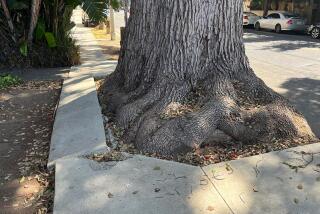Controversy, Expectations Mark Changing of Guard at City Halls : New Culver City Mayor Announces His Blueprint for Municipal Growth
- Share via
No sooner had he taken over the largely ceremonial position of mayor of Culver City on Monday than Richard R. Brundo announced the city’s “Strategic Plan 2001,” a blueprint he said the City Council will use to help guide city planning into the next century.
The 45-year-old interior decorator said that during his one-year term as mayor the city would see the widening of busy Overland and Sepulveda boulevards and three new downtown projects, including two office buildings and a parking lot/retail development.
“We want to hold the residential character of our city by reducing density and . . . development,” said Brundo, who was unanimously appointed mayor by the council. “And keeping traffic congestion down will be a big key.”
Brundo said that the “Strategic Plan 2001,” the name he gave the plan, will focus on ways to reduce traffic snarls and building density within the city, as well as other planning issues.
The plan is based on ideas discussed by the council and senior staff members at a three-day retreat at the Pacifica hotel two weeks ago, Brundo said.
Once the council decides later this year on a list of basic goals, it will form citizen committees to recommend how the city should meet those goals, he said.
This is the fourth time Brudno will serve as mayor. He was elected to the council in 1976 after unsuccessful bids in 1972 and 1974.
Although the mayor is rotated each year, it provides valuable exposure to a council candidate. This is especially significant for Brundo, who said he already plans to run for a fourth term in the April 4 council election.
Newly elected Vice Mayor Paul A. Jacobs and Councilman Paul A. Netzel also have said they would run for council seats next year. Jacobs will seek a fourth term, Netzel a third.
Councilman Richard M. Alexander was elected to a fourth term last year. Councilwoman Jozelle Smith was elected to her first term last year.
Discounts Importance
Brundo discounted the importance of the mayor’s job to his reelection campaign. But he said that the mayor receives up to five invitations a week to appear at various functions before potential voters in Culver City. The mayor is also asked to speak for the city on radio and television talk shows, he said.
“The more exposure the better,” Brundo said. “On the same token, the mayor is the ex officio president of the council, and if the council makes a mistake, the mayor will be blamed. But it is an asset.”
Netzel, whose term as mayor expired Monday, agreed that the title benefits an incumbent councilman during an election.
“It can work both ways but on balance it can be an advantage,” he said. “Your name tends to be out in the press more than other (council members) as a general rule. But if there is an issue that is controversial and you happen to be on the unpopular side, it could become a problem.”
Jacobs, however disagreed. “Being mayor at the time you are running for another term is not a very significant advantage. The mayor is simply a ceremonial figure under our government.”
The mayor chairs council meetings and serves as the city’s representative on two Los Angeles County sanitation districts, the League of California Cities and the Southern California Assn. of Governments.
The mayor signs all new city laws and his signature appears on all payments for city bills. The mayor also serves as official spokesman for the city.
More to Read
Sign up for Essential California
The most important California stories and recommendations in your inbox every morning.
You may occasionally receive promotional content from the Los Angeles Times.










